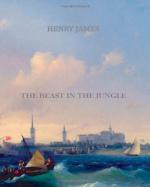|
This section contains 270 words (approx. 1 page at 400 words per page) |

|
The Beast in the Jungle Summary & Study Guide Description
The Beast in the Jungle Summary & Study Guide includes comprehensive information and analysis to help you understand the book. This study guide contains the following sections:
This detailed literature summary also contains Bibliography and a Free Quiz on The Beast in the Jungle by Henry James.
Literary critics generally agree that Henry James's career can be divided into three periods, the first from 1876 to the mid-1880s, the second from the mid-1880s to 1897, and the third from 1897 to his death. James's "The Beast in the Jungle" was written and published in the final phase of James's career (1903). Like other works composed during this period, this story's style is the product of James's desire to minutely render the permutations of an individual consciousness, in this case the mind of the story's protagonist, John Marcher. Thematically, this story can be linked to one of the greatest novels of his later period, The Ambassadors, which was also published in 1903.
Both "The Beast in the Jungle" and The Ambassadors, even if in different ways, present the reader with the idea of the failure to live life. "The Beast in the Jungle" is the story of John Marcher, who believes he is destined for a special fate. This conviction is so profound that instead of delving into life, Marcher chooses to live at life's fringe, waiting for this special event to occur. When, at the end of his life, Marcher decides that he was mistaken in his conviction, and that nothing of momentous import was in fact to be his destiny, he is left a broken man. He realizes that his exceptionality is of a purely negative aspect: "The fate he had been marked for he met with a vengeance—he had emptied the cup to the lees; he had been the man of his time, the man, to whom nothing on earth was to have happened."
Read more from the Study Guide
|
This section contains 270 words (approx. 1 page at 400 words per page) |

|



